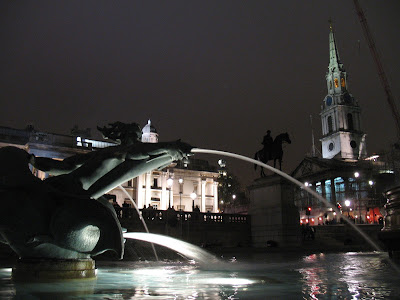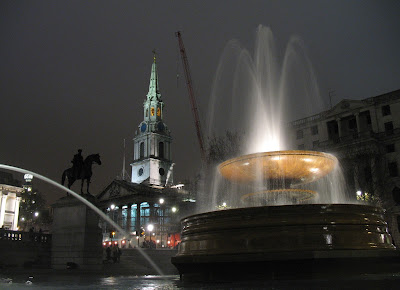I've finally got around to re-reading CS Lewis'
Cosmic Trilogy:
Out of the Silent Planet,
Perelandra and
That Hideous Strength.
Overall, I'd best describe the trilogy as Very Odd, although not necessarily in a bad way! Not science fiction as you'd know it, but fantasy as Lewis does best, with talking beasts and fantastic creatures, only set this time in space. As in the Narnia stories he has woven in the 'Deeper Magic', the Story above - and below - all stories, while creating a cosmology entirely his own.
The Trilogy tells the story of a man called Ransom, a Christian professor who finds himself quite unexpectedly taken to Mars (or
Malacandra), and then later to Venus (
Perelandra). His journey out of the 'Silent Planet' (that is, Earth) leads to some remarkable discoveries about the universe, and a radical perspective change in his theology and cosmology.
My favourite book was the second. It's thoroughly fantastic, functioning as a myth in the way that Lewis does best. Ransom goes to Venus and witnesses the birth of a new race and its first
temptation. Will this Eden also fall?
One of my favourite pieces of dialogue in the book is the conversation between the Green Lady and Ransom about why she is human and why fantastic creatures occur only on the more ancient worlds.
She is bewildered by his question and asks him, "
How could they come again? Since our Beloved became a man, how should Reason in any world take on another form? Do you not understand? That is all over. Among times there is a time that turns a corner and everything on this side of it is new. Times do not go backward." Jesus is the turning point of all history. Nothing will ever be the same again.
The 'black
archon' of Earth, whom
Maleldil has
blockaded on the planet (thus, 'the Silent Planet') has found a way to travel to
Perelandra in the body of a twisted physicist called Dr Weston. In some of the most interesting scenes in the book, Ransom is forced to watch as the '
Un-man' uses every trick in the book to tempt the Lady to disobey
Maleldil. Until finally, the Presence himself turns up.
Much to Ransom's dismay, there will be no supernatural intervention. He is
Maleldil's representative on
Perelandra and, not only must he 'do his best', in fact the very outcome of the battle is in his mortal hands. Literally in his hands, for the struggle he must have with the Tempter is a physical one, to destroy the human body that he inhabits. This is not what he expects, for "
no such crude, materialistic struggle could be what Maleldil really intended...it would degrade the spiritual warfare to the condition of mere mythology." But he comes to realise that in the Incarnation, the spiritual has been bound up with the physical to such a degree that they can no longer be separated. He cannot draw a parallel between Eden and
Perelandra because "
What had happened on Earth, when Maleldil was born a man at Bethlehem, had altered the universe for ever."
It is Lewis' high view of the nature of humanity and his reflections on the universe-shattering nature of the Incarnation which is the most distinctive theme in the book. His use of Ransom reflects his understanding that God has chosen to effect his redemptive purposes through men and women:
"
When Eve fell, God was not Man. He had not yet made men members of His body: since then He had, and through them henceforward He would save and suffer."
The task has come to this man, Ransom, to save a world from a fall. But, in one of the most thrilling lines in the book, the Voice tells him, "My name is also Ransom". He comes to understand that if even he fails "
this world also would hereafter be redeemed. If he were not the ransom, Another would be...Not a second crucifixion: perhaps - who knows - not even a second Incarnation... some act of even more appalling love, some glory of yet deeper humility... her Redemption was beyond conceiving".
The outcome of the story I'll leave to you to find out!
Lewis' creations are always memorable, his fantasies tend to stick around in your consciousness, invading your worldview. You're left having to remind yourself that no, Mars really is just a cold and barren rock. And there's almost a sadness in coming back to reality and remembering the facts. Yet at the same time, it's a short-lived sadness, for his re-telling of the Big Story leaves me with a deeper, wider view of the real story. For, however fantastic the universes that Lewis creates, the reality is infinitely more glorious! Who can comprehend the mind of God, the intricacies of his plan, the delights he has in store for us?
(I've lots more I could say about
That Hideous Strength, but that will have to wait for another day.)
I'd certainly recommend the first two books of the trilogy, for although they don't represent Lewis' best writing, they'll unsettle and stretch your worldview and that's never a bad thing!







